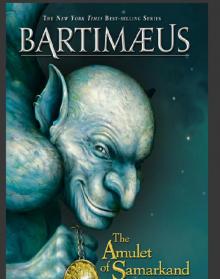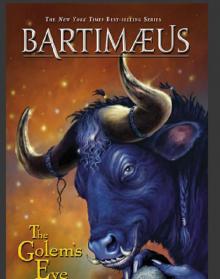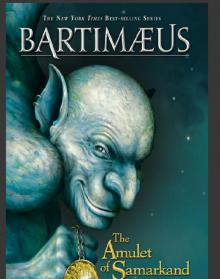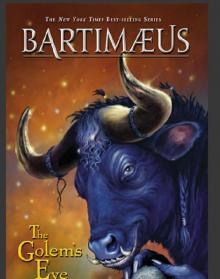- Home
- Jonathan Stroud
The Ring of Solomon Page 19
The Ring of Solomon Read online
Page 19
4 Which were pretty harsh at the best of times. Back in Khufu’s day, apprentice priests who made too much noise as they walked the sacred precincts were given to the sacred crocodiles. The theory was that if a boy was going to make unpleasant noises, he might as well do it to some purpose. Those crocs needed feeding once a month.
5 In general I’m not one for burning books, this being a favoured pastime of all the worst rulers in history. But magicians’ stockpiles of knowledge (tablets, scrolls and, later, parchment and paper folios) are a special case, since they contain the names of spirits by the thousand, ready for future generations to summon. If they were all erased, theoretically, our slavery would cease at once. This, of course, is an impossible dream – but destroying Khaba’s reference library made me feel good. Every little helps.
Part
Three
21
Asmira stood close beside the panelled door, listening to the soft footsteps of the servant die away. When all was quiet, she tested the door and found it unlocked; opening it slightly, she peered down the corridor outside. The oil lamps flickered in their recesses, the bright tapestries hung upon the walls; along the floor the tiles of polished marble shone and glittered. No one was near. No one, at any rate, that she could see.
She closed the door again, and with her back against it considered the guest room she had been given. It was, at a rough estimate, five or six times bigger than her little bedchamber in the guards’ annexe in Marib. Its floor, like the corridor’s, was formed of intricate marble tiles. Along one wall stretched a silken couch of a luxuriousness rivalling that of the chambers of Queen Balkis. Lamps glowed warmly on wooden cabinets; behind two drapes a basin of water gently steamed. On a plinth beside the window sat a statue of a boy playing a lyre, fashioned from strips of beaten bronze; from its strangeness and evident fragility, she knew it must be very old.
Leaving her bag on the couch, Asmira crossed to the window, pulled aside its drapes and scrambled up onto the ledge. Outside was starlight, cold and clear, and a sheer drop down the side of the palace wall to a patch of rocks and boulders on the eastern side of Jerusalem’s hill. She craned her neck for nearby ledges, or other windows she might inch over to in time of need, but saw none.
Asmira drew her head inside, aware suddenly of how weak she felt. She hadn’t eaten since the morning. Alongside that, however, she felt a cold elation: ahead of schedule, with two days yet to go before Sheba’s time ran out, she was inside Solomon’s palace, somewhere close to the wicked king.
With luck she might be brought before him within hours.
In which case, she must prepare herself. Shaking off her weariness, she hopped down from the sill, went to the couch and opened her bag. Ignoring the candles and cloths wedged at the bottom, she removed the final two daggers, which she fitted next to the one already secreted in her belt. Three was prudent, if probably unnecessary. A single dagger-thrust would be enough to do the job.
Letting her robes fall forward to conceal the weapons, she smoothed back her hair and went to wash her face. Now she must make herself look the part once more: a sweet, naive priestess from Himyar, come to ask the aid of wise King Solomon.
If he was anything like the loathsome Khaba, it was a ruse that would fool him well.
After its final descent into the palace, the magician’s carpet had come to a halt before two great closed doors. They were twenty foot high, and made of black volcanic glass, smooth, featureless and shining. Six giant copper hinges anchored them into the fabric of the wall. Two copper door-knockers, shaped like twisting serpents biting their own tails, hung slightly out of human reach; each was longer than Asmira’s arms. Above and around the doors was a crenellated gateway, its portico decorated with raised reliefs in blue-glazed brickwork, depicting lions, cranes, elephants and terrifying djinn.
‘I’m sorry that I must bring you to this little side entrance,’ the magician, Khaba, said. ‘The main doors are reserved for King Solomon, and for occasional state visits by his client kings. But I shall ensure that you are met with all due courtesy.’
At this he had clapped his hands, a slight and brittle noise. At once the doors swung inwards, swift and soundless, moving on oiled hinges. Beyond, in the revealed dimness of a vast reception hall, twin teams of straining implets laboured on pulley ropes. Between them, rows of lantern-bearers stood left and right, supporting, with the aid of chains, long wooden torches that jutted from their belt-cusps. Bright yellow fire danced at the torch ends. They bowed their heads in welcome and moved aside; the carpet eased forward and descended to the marbled floor.
To Asmira’s annoyance, she was not shown instantly to Solomon’s presence. Instead, soft-voiced servants hastened from the shadows, and she and Khaba were ushered away to a high, pillared room strewn with silken cushions, where smiling, bright-eyed children – whom Asmira doubted were quite as human as they appeared – served them glasses of frosted wine.
The following half-hour proved almost as disagreeable for Asmira as the ambush in the gorge: a long, intimate talk with the magician, who, with the prompting of the wine, became more and more attentive. His big, soft eyes gazed into hers, his sallow-skinned hand drew close upon the cushions; it was all she could do not to flinch away. Khaba remained condescendingly polite, but deflected her requests for an immediate audience with the king, and was evasive about when it might be arranged. Gritting her teeth, Asmira maintained her outward show, amusing him with breathless expressions of gratitude, and flattering him with easy words.
‘King Solomon must be powerful indeed,’ she breathed, ‘to have a great one such as you in his service!’ She tilted her head and made pretence of drinking from her cup.
Khaba grunted. For a moment his enthusiasm waned. ‘Yes, yes. He is powerful.’
‘Oh, how I long to speak with him!’
‘You should be careful, Priestess,’ Khaba said. ‘He is not always kind, even to pretty maids like you. They say that once’ – he looked instinctively about the pillared room – ‘they say that once a wife of his, a comely Phoenician girl, plied him with wine as they lay upon their pallet. When he was sleeping, she strove to remove the Ring. She had it to the second knuckle when Solomon was awoken by the call of a bird outside the window. He speaks with the birds, as perhaps you know. Ever afterwards, that Phoenician girl has haunted the pine trees of the Kidron Valley, a white owl with wild eyes whose cry means death to someone of the royal house.’ Khaba took a reflective sip of wine. ‘You see, Solomon can be terrible.’
Asmira had kept her face suitably agog, but inside she was thinking how stupid the Phoenician girl had been, trying to wrestle the Ring clear when one strike with a knife would have sufficed. She said: ‘I suppose kings must be ruthless in protecting what is theirs. But you are kind and gentle, are you not, great Khaba? Speaking of which, what of my earlier request? Will you release those two demons who saved my life?’
The magician threw a bony hand up in the air, eyes rolling. ‘Priestess Cyrine, you are remorseless! You will not be denied! All right, yes – you need say no more. I shall dismiss those servants from my service this very night!’
Asmira fluttered her eyelashes in feigned admiration. ‘You vow it, O Khaba?’
‘Yes, yes, I vow it on the great god Ra, and all the gods of Ombos – provided,’ he said, leaning in a little closer and staring at her with his shining eyes, ‘that I may in return speak with you again at dinner in the palace this evening. Other dignitaries will be there, of course; also my fellow magicians—’
‘And King Solomon?’ Here, finally, Asmira’s eagerness was genuine.
‘Possibly, possibly … It is not unknown. Now, see – here is a servitor waiting. A guest room has been prepared for you. But first … another glass of wine? No?’ Asmira was already rising. ‘Ah, you are tired. Of course; I understand. But we shall meet again at dinner,’ Khaba said, bowing, ‘and – I trust – become much better acquainted …’
A knock sounded on the chamber do
or. Asmira was at once alert. Patting down her robes, checking that the knife-hilts were invisible beneath the cloth, she crossed to the door and opened it.
In the dimly lit corridor a man stood waiting, framed in a star-shaped pool of light, the source of which could not be seen. He wore a plain white robe of high office. He was small and slight, and very dark of skin; Asmira guessed him to be a man from Kush, or somewhere in the Nile lands. On his shoulder sat a white mouse with glowing eyes as green as emeralds. It tilted its head to look at her.
‘Priestess Cyrine,’ the man said, ‘I am Hiram, Solomon’s vizier. I welcome you to his house. If you will follow me, I can offer you refreshment.’
‘Thank you. That would be gratifying indeed. However, I urgently seek audience with King Solomon. I wonder whether—’
The small man smiled bleakly. He held up his hand. ‘In time all things may be possible. As for now, a meal begins soon in the Magicians’ Hall; to this you are invited. Please …’ He gestured towards the door.
Asmira stepped forward; instantly the white mouse gave a squeak of alarm, stood up on its hind legs and chittered loudly in the magician’s ear.
The vizier’s forehead furrowed; he stared at Asmira with his heavy-lidded eyes. ‘Forgive me, Priestess,’ he said slowly. ‘My slave, great Tybalt here, says the taint of silver is very strong about your person.’ Upon his shoulder the mouse rubbed his whiskers furiously with a paw. ‘Tybalt says it makes him want to sneeze.’
Asmira could feel her silver daggers pressing hard against her thigh. She smiled. ‘Perhaps he refers to this.’ From beneath her tunic she pulled out her silver necklace. ‘It is a symbol of the great Sun God, who watches over me throughout my life. I have worn it round my neck since birth.’
The vizier frowned. ‘Could you possibly remove it? It may aggravate spirits such as Tybalt, who abound across the palace. They are sensitive to such things.’
Asmira smiled. ‘Alas, to do so would cut my birth-luck short, and bring the wrath of the Sun God down upon me. Do you not also have this custom in Jerusalem?’
The magician shrugged. ‘I’m no expert, but I believe the Israelites worship some other deity. Well, we each must follow our beliefs as best we may. No, Tybalt – hold your tongue!’ The mouse had been uttering shrill protests in his ear. ‘She is a guest; we must make allowances for her oddities. Priestess Cyrine – please follow me …’
He left the room and moved away across the cool, dim slabs of marble, framed in a gliding star of light. Asmira followed close behind. From its perch upon the magician’s shoulder the green-eyed mouse continued to look her keenly up and down.
Off through the palace they went, the magician limping a little in his long white robes, Asmira stalking along behind. Along torch-lit corridors; down marbled steps; past windows overlooking gardens of dark trees; through grandiose galleries, empty save for plinths supporting fragments of ancient statuary. Asmira glanced at the pieces as she passed. She recognized Egyptian work, and certain styles from north Arabia, but other forms were unknown to her. There were sculptures of warriors, women, animal-headed spirits, battles, processions, people working in the fields …
The vizier noticed her inspection. ‘Solomon is a collector,’ he said. ‘It is his greatest passion. He studies relics from civilizations of the past. See there – that monumental head? That is the pharaoh Tuthmosis III, taken from a colossal statue he erected in Canaan, not far from here. Solomon found the fragments buried in the earth, and had us bring the pieces to Jerusalem.’ The magician’s eyes glittered in his mage-light. ‘What do you think of the palace, Priestess? Impressive, is it not?’
‘It is very large. Bigger than the queen’s house in Himyar, if not so beautiful.’
The vizier laughed. ‘Was your queen’s palace built in a single night, as this was? Solomon wished his residence to exceed the glories of old Babylon. What did he do? He summoned the Spirit of the Ring! The Spirit commanded nine thousand djinn to appear. Each carried a bucket and a shovel and flew on butterfly wings, so that the sound of their labours would not wake the wives in the harem camp below the hill. As dawn broke, the final brick was eased into place, and water began to flow from the fountains in the garden. Solomon breakfasted beneath orange trees that had been brought from eastern lands. From the first it has been a house of marvels, like nothing yet witnessed in the world!’
Asmira thought of the fragile mud-brick towers of Marib, painstakingly tended and patched by her people down the centuries, now threatened by this self-same Ring. Her teeth clamped tight; still, she affected a tone of guileless wonder. ‘All in a single night!’ she said. ‘Can this truly be the work of one small ring?’
A sidelong glance beneath the heavy lids. ‘It is so.’
‘Where does it come from?’
‘Who can tell? Ask Solomon.’
‘Did he make it, perhaps?’
The green-eyed mouse chittered with mirth. ‘I think not!’ the vizier said. ‘In his youth Solomon was a magician of small competence, not yet a great one of the world. But always a passion for the mysteries of the past burned like a flame inside him, a love of long ago, when magic was first practised and the first demons brought out of the abyss. Solomon collected artefacts from those early civilizations, and to that end travelled extensively in the east. The stories say he grew lost one day, and came upon a place of ancient ruins, where, hidden beyond the sight of man or spirits for who knows how many years, he chanced upon the Ring …’ The vizier smiled grimly. ‘I do not know the truth of that, but this I do know. From the time he picked up that Ring, fate has favoured him more than any living man.’
Asmira gave a little maidenly sigh. ‘How I wish to speak with him!’
‘No doubt. Unfortunately you are not alone. Other supplicants have arrived in Jerusalem on missions similar to yours. Here! This is the viewing gallery above the Magicians’ Hall. Take a look, if you wish, before we go down.’
In the side of the corridor, a stone alcove; in the centre of the alcove, an opening. Beyond was a vast space, shimmering with light. From it rose a swell of sound.
Asmira went to the alcove, set her hands upon cold marble, leaned out a little way.
Her heart caught in her throat.
She looked down upon a hall of immense size, lit with floating orbs. The roof was made of dark, rich wood, each beam a tree’s length. The walls, inset with columns inscribed with magic signs, had been coated in plaster and painted with wondrous scenes of dancing animals and spirits. All along the hall were rows of trestle tables, at which sat a vast company of men and women, eating and drinking from plates of gold. Broad platters of every kind of food were piled before them. White-winged djinn, wearing the bodies of youths with golden hair, drifted above the tables, carrying jugs of wine. As hands were raised and orders given, the youths flitted down, pouring glittering red streams of wine into the waiting cups.
The people at the tables were of even greater variety than Asmira had seen in Eilat. Some were very new to her: strange pale-skinned men with reddish beards and uncouth fur-lined clothes, or dainty women in dresses formed of woven flakes of jade. The whole great multitude sat and ate, and drank, and talked together, while high above, in the centre of the plaster wall, between the cavorting djinn, a painted king watched over all. He was drawn sitting upon a throne. His eyes were dark, his face beautiful and strong; faint beams of light radiated from his person. He stared straight out in calm and solemn majesty, and on his finger he wore a ring.
‘All these delegations,’ the vizier said drily at her shoulder, ‘are here to seek aid from Solomon, just as you are. All, like you, have matters of the utmost importance to discuss. So you will see that it is a ticklish business to please everyone. Still, we try to keep everyone fed and watered while they wait their turn. Most are satisfied; some even forget the business that brought them here.’ He chuckled. ‘Come then, you shall join their number. We have a place set ready for you.’
He turned away. Hot-eyed, dry-m
outhed, Asmira followed him.
22
The food, at least, was good, and for a time Asmira thought of nothing but roasted meat and grapes and honeyed cakes and dark red wine. The noise of the hall engulfed her; she felt cocooned by it, swaddled in its splendour. At last, with pains in her belly and a warm haze in her brain, she sat back and looked around. The vizier was right. In such a place it would be easy for anyone to get detached from the purpose that had brought them here. She glanced up with narrowed eyes at the great throned figure painted on the wall: perhaps, indeed, this was what Solomon intended.
‘New, are you?’ the man beside her said. With his knife he speared a small glazed piece of meat from a selection on his plate. ‘Welcome! Try a jerboa!’ He spoke Arabic, though with a strange inflection.
‘Thank you,’ Asmira said. ‘I am already full. Are you here to speak with Solomon?’
‘I am. Need a dam built above our village. There’s water enough in the spring, but it all runs past. In the summer there’s drought. One touch of the Ring should sort it. Just need a few afrits, or a marid or two.’ He took a bite and went on chewing. ‘You?’
‘Something similar.’
‘We need terraces dug in our valley.’ This was the person opposite, a woman with bright, almost fevered eyes. ‘It’s too steep, you see. But his slaves could do it easily. Not hard for him, is it?’
‘I see,’ Asmira said. ‘How long have you waited?’
‘Five weeks, but my time is almost up! I shall be one of the lucky few next council!’
‘That’s what they told me two weeks ago,’ another man said dourly.

 The Leap
The Leap Buried Fire
Buried Fire Heroes of the Valley
Heroes of the Valley The Empty Grave
The Empty Grave The Hollow Boy
The Hollow Boy The Last Siege
The Last Siege The Dagger in the Desk
The Dagger in the Desk The Amulet of Samarkand
The Amulet of Samarkand The Golem's Eye
The Golem's Eye The Screaming Staircase
The Screaming Staircase The Outlaws Scarlett and Browne
The Outlaws Scarlett and Browne The Ring of Solomon: A Bartimaeus Novel
The Ring of Solomon: A Bartimaeus Novel Lockwood & Co
Lockwood & Co Lockwood & Co: The Screaming Staircase
Lockwood & Co: The Screaming Staircase Bartimaeus: The Amulet of Samarkand
Bartimaeus: The Amulet of Samarkand The Amulet of Samarkand tbt-1
The Amulet of Samarkand tbt-1 Lockwood & Co.: The Creeping Shadow
Lockwood & Co.: The Creeping Shadow The Ring of Solomon
The Ring of Solomon Lockwood & Co. Book Three: The Hollow Boy
Lockwood & Co. Book Three: The Hollow Boy Bartimaeus: The Golem’s Eye
Bartimaeus: The Golem’s Eye